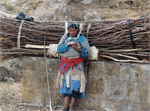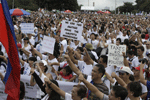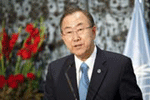Social Watch news
Published on Wed, 2013-09-18 00:00
Brazilian development policy underwent a major transformation in the last decade, having the Brazilian Development Bank (BNDES, by its acronym in Portuguese) as the great symbol of this process. In 2004 disbursements by the bank were in the order of USD 40 billion, while in 2010 they totaled over USD 168 billion. This growth by the bank occurred with a clear intention of the Brazilian government. The two main sources of bank financing are the Workers’ Support Fund and the National Treasury, but while the former has a fixed value (40 per cent of the fund), the amount deposited by the Treasury varies from Brazilian Real 43 billion in 2008 to a staggering 376 billion in 2012. However if the rise and importance of the bank in the last decade is unquestionable, the development model chosen raises many doubts. |
Published on Tue, 2013-09-17 00:00
The ongoing Post-2015 development agenda (including the SDGs) process is still short of prioritising the special needs and challenges of the LDCs and its peoples. The MDGs, albeit minimal in scope, has a dedicated target pertaining to the LDCs under Goal 8: Develop a global partnership for development. Conversely, the proposed new-generation goals in the report by the UN Secretary-General’s High-Level Panel of Eminent Persons on the Post-2015 Development Agenda (HLP) dilute the due special development attention to the LDCs. A stand-alone goal targeting global development partnership for the LDCs is a non-negotiable along with a cross-cutting treatment with specific reference premised upon their special situations and vulnerabilities. |
Published on Fri, 2013-09-13 22:48
“The abolition of the pork barrel system should be total” said Leonor Briones, lead convenor Social Watch Philippines, to a Congressional committee in Manila, bringing to legislators the message that hundreds of thousands of people had reaffirmed in the streets during marches against corruption in the previous days. “Pork barrel” is the popular name of a system that allows members of parliament the direct allocation of budget funds to pet projects in their constituencies. Some “pork barrel amount to the equivalent of four million dollars a year. The president himself manages a “pork barrel fund” of some 500 million dollars and several items of the Special Purpose Funds (SPF) in the national budget for 2014. “SPFs breed corruption. How can Congress scrutinize the SPF when there is no detail? It is just one chart in the budget documents and one line in the summary papers,” SWP said Briones. |
Published on Fri, 2013-09-13 17:24
The open panel on "Progress and Challenges on Tax Justice and Social Justice in Uruguay", put together by Development Alternatives with Women for a New Era (DAWN), Center of Concern, Social Watch and the Association for Women's Rights in Development (AWID) - all members of the Righting Finance Initiative - together with the International Council for Adult Education (ICAE) took place on Friday, August 16, 2013. Eduardo Brenta, Labour and Social Security Minister and Pablo Ferreri, Director of the Directorate-General for Taxation (DGI) discussed the impact of Uruguay tax and labor polices in terms of redistribution and the future challenges together with academics, feminist and human rights activists. |
Published on Thu, 2013-09-12 19:24
This historic ILO Convention gives domestic workers the same rights as other workers. The International Labour Organization’s Domestic Workers Convention, 2011 (No. 189)comes into force on 5 September 2013, extending basic labour rights to domestic workers around the globe. |
Published on Mon, 2013-09-09 00:00
The human rights impacts of fiscal and tax policy will be the subject of an upcoming report by the Special Rapporteur on Human Rights and Extreme Poverty. The report, to be presented in June of next year (at the 26th session of the United Nations Human Rights Council) comes on the throes of growing scrutiny of economic policies by human rights advocates and will likely be welcome not just by them, but also by organizations that work on tax justice and revenue transparency issues and will draw reassurance from seeing their concern become a human rights issue. |
|
Published on Thu, 2013-09-05 22:09
A consortium of civil society organisations (CSOs) of which Women for a Change is part, has reiterated its call on government to suspend the current non-governmental organisation (NGO) registration exercise and immediately initiate a process to repeal the Act. The civil society organisations said they will remain resolute and unshaken to any innuendos and manoeuvres by any section of society to force them to be registered under an instrument that they claim was aimed at ‘killing’ the country’s democratic liberty. |
Published on Mon, 2013-09-02 09:16
The political stalemate continues in Egypt; the dismissal of the Rabeaa and Al‐Nahda sit‐ins was one of its bloodiest events. Although many players are keen to protect the Egyptian state, safeguard its persistence and support its role, efforts are still required on all fronts, including the international front, to reach effective and permanent solutions s that respect human rights and allow for a resumption of the transitional political process. This process includes promulgating a new constitution that meets the aspirations of all Egyptians s of all factions and affiliations and making conditions suitable for holding fair, democratic and unchallengeable elections. This will guarantee the right of Egyptian men and women to decide a future for them and for their representative institutions. The Arab NGO Network for Development (ANND), Beirut released a statement on August 27, 2013. |
Published on Fri, 2013-08-30 00:00
The U.S. Federal Reserve recently announced it is reviewing its policy allowing financial firms to trade in physical commodities, which has been known to distort market prices of food, fuels, and metals. This reassessment comes almost a decade after the Fed ruled that Citigroup Inc. could continue trading in physical commodities after finding the practice within the bounds of the firm’s trading and investing in financial instruments. |
Published on Thu, 2013-08-22 13:37
"A life of dignity for all" should be the common goal of world governments, says Ban Ki-moon, Secretary General of the United Nations in the report sent on Friday August 16 to the General Assembly of the UN. The sixty agencies and programs of the UN dealing with development currently guide their actions by the Millennium Development Goals proposed and imposed at the beginning of the century by donors, without the member states having had a chance to discuss them. The MDGs "expire" in 2015 and their replacement by a new development agenda is being hotly debated by the international community, including now also civil society organizations, philanthropic foundations, corporations and even the Internet-based social media. |
SUSCRIBE TO OUR NEWSLETTER









